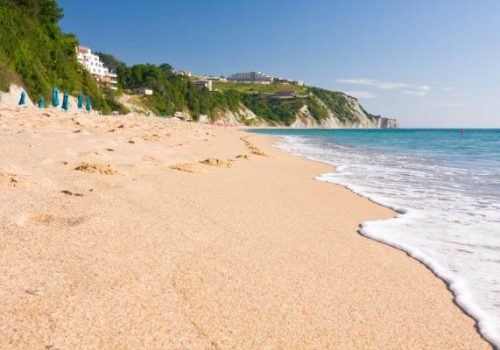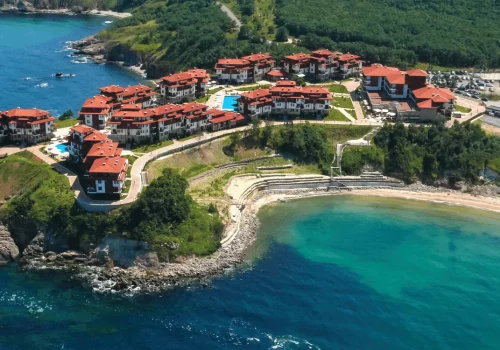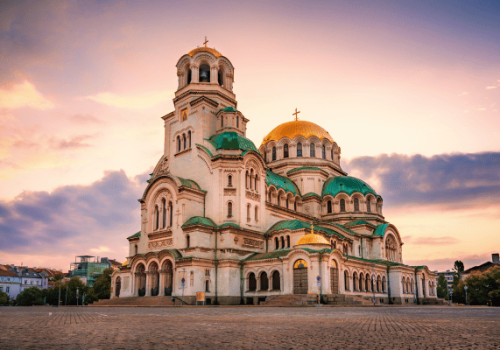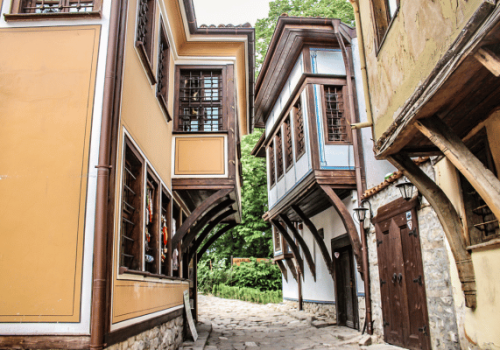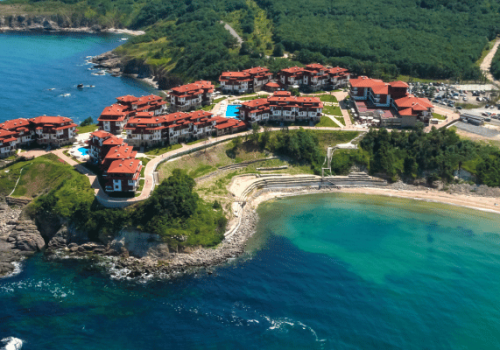Living and Working in Bulgaria
Information & guidance about seasonal jobs in Bulgaria
Located between western Asia and southeastern Europe, Bulgaria offers a delightful blend of nature and history, featuring endless cultural diversity and unforgettable experiences. Bulgaria’s Black Sea draws locals and travellers alike, complemented by the untamed landscapes that offer the prospect of adventures and amazing views.
Seasonal jobs in Bulgaria
- Customer support
- Bulgaria
Working in Bulgaria
Working Conditions in Bulgaria
Working conditions in Bulgaria are similar to those in the West Europe: 8-hour workdays and 5 days per week. Employees are entitled to 20 days of annual leave. All individuals pay a flat tax rate that is automatically deducted from their monthly income. You can read more about income tax in Bulgaria below.
Salaries in Bulgaria
Because the cost of living in Bulgaria is relatively low, salaries are also lower. The average monthly gross salary is approximately €1250. This translates to around €1000 net per month. The lev (BGN) is considered the most stable currency in Eastern Europe.
Working in Bulgaria: Experiences
Despite the fact that living abroad is an enriching experience, it is, of course, a significant step. It’s nice and important to have some idea of what to expect in advance. In this section, you can read about the living and working experience of our candidate Kelly van der Heide. Kelly started her customer service job in Sofia in 2021.
What do you like most about living in Sofia?
“The landscape! The landscape in Bulgaria is very different. You have mountains and many beaches. In the summer, you can enjoy the warm weather on the beach, and in winter, you can go skiing.
What I also really like is that the stores in Sofia stay open much later. Even if I have a late shift, I can still go to the mall afterward. Plus, I’m very happy with my two-bedroom apartment in Sofia, and the rent is incredibly low compared to the Netherlands.”
What is it like to work in an international environment?
“I find it very enjoyable to work in an international environment because it exposes me to different languages and cultures every day. My employer in Sofia mainly has employees from the Netherlands, Belgium, and France, and it’s always interesting to talk about the differences between our countries. Working in Bulgaria not only teaches you a lot about Bulgaria but also about other countries and cultures.”
Income Tax in Bulgaria
If you are employed in Bulgaria, your employer withholds income tax from your salary every month. You must then submit an annual tax return to receive any refunds or discounts to which you are entitled.
Starting from 2022, the income tax rate in Bulgaria is 13%. Income tax in Bulgaria is relatively low compared to other European countries. This is good news for anyone working in Bulgaria because it means you have more than enough money each month to explore the country.
Additionally, the Bulgarian government provides taxpayers with various incentives and deductions. For example, if you are a first-time taxpayer, you may qualify for an income tax deduction. And if you have children, you may be eligible for a dependent person’s deduction on your tax return.
Working in Sofia
Are you eager to work abroad? Have you set your sights on the beautiful Bulgaria? Well, now’s the time to decide where in Bulgaria you’d like to work and live. Perhaps the vibrant capital, Sofia, catches your eye? This versatile city is growing in popularity among expats from all around the world, and we completely understand why!
Sofia is a lively and cosmopolitan city with plenty to offer. Some key sectors in Sofia include IT and tourism. However, various other sectors, such as healthcare, finance, and education, also offer ample opportunities.
In summary, working in Sofia is an excellent opportunity to develop your skills and elevate your career to new heights. So, feel free to explore our Bulgaria job listings where you’ll find various vacancies in Bulgaria and Sofia.
Holidays in Bulgaria
Bulgaria celebrates a total of 13 official holidays, including both national and religious observances. National holidays encompass New Year’s Day, Liberation Day, and Christmas, while religious holidays include Easter Sunday and Christmas Eve.
On official holidays, businesses and government institutions in Bulgaria are usually closed.
Bulgaria is a country with a rich history and culture, and its holidays reflect that by commemorating significant moments in Bulgaria’s past. These celebrations also provide people with the opportunity to come together and enjoy time with family and friends.
Voluntary work in Bulgaria
The diverse landscape means there are a range of locations that offer great destinations for voluntary work in Bulgaria, and the seven million strong population means the projects vary depending on how you wish to lend a hand.
The capital and largest city Sofia, is a popular choice for volunteering in Bulgaria; with a population of over one million people the city is the political and economic kingdom of the country. Increasingly growing in popularity as a tourist destination, the combination of stunning ancient architecture and modern sights make it a bustling destination where a volunteer will find themselves constantly exploring.
Varna and Plovdiv are smaller cities, each with populations of around 300,000, but still offer fulfilling experiences for volunteers. Varna sits on the Black Sea in the east with a bar-lined waterfront, the city offers a taste of Bulgarian culture where you’ll find Bulgaria’s largest Roman baths, alongside a lively cultural and restaurant scene. Plovdiv sits on the banks of Maritsa River, and as Europe’s oldest continuously inhabited city mingles electric nightlife with millennia old ruins and an abundance of history.
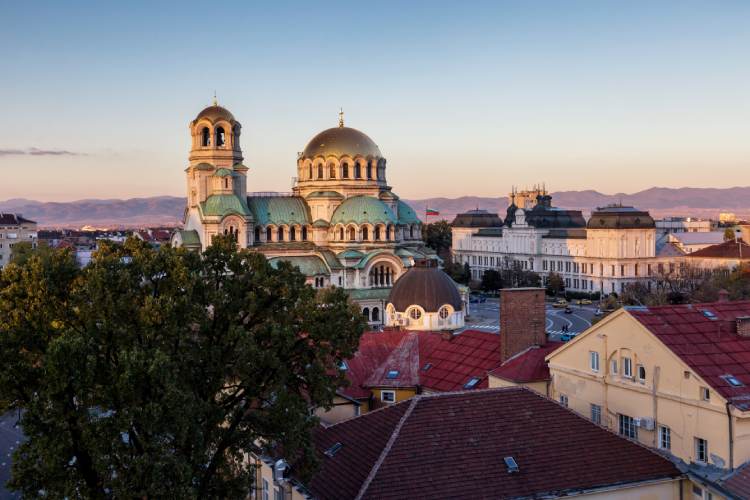
Living in Bulgaria
Living in Bulgaria is an adventure and significantly more budget-friendly than in the Netherlands. A two-bedroom apartment in the center of Sofia costs around €350 – €380. For utilities like gas, water, and electricity, you’ll pay up to €50 per month, and internet costs about €10 per month.
Advantages of Living and Working in Bulgaria
Working and living abroad is a valuable experience, but why should you consider moving to Bulgaria? Bulgaria offers a wide range of experiences, from a peaceful life in a village where they still use horse-drawn carriages to get around, to a modern city like Sofia.
With low taxes, affordable living costs, delicious food, sunny beaches, diverse outdoor activities, and friendly people, living and working in Bulgaria is highly appealing. Will you opt for the capital, Sofia, the sun-soaked Sunny Beach, the ski resort of Bansko, one of the many villages along the Black Sea, or the ancient old town of Plovdiv?
Accommodation in Bulgaria
Websites that make it easy to find accommodation include:
The desirable neighbourhoods to live in Sofia are those close to the city center, such as Geo Milev, Lozenets, Simeonovo, and Oborishte.
Transportation in Bulgaria
Bulgaria offers numerous transportation options that are incredibly budget-friendly. A daily bus pass costs just €2 for all routes. If you’re traveling from Sofia’s airport to the city center, a taxi ride will set you back around €10.
While trains may not be the fastest, they provide a cost-effective way to travel between Bulgarian cities. With a basic ticket priced at €15, you can traverse the entire country. For an additional €4, you can upgrade to first class, which even includes a sleeping berth. Buses, often equipped with air conditioning or heating, are frequently faster than trains and come at comparable prices.
For flights, Bulgaria is easily accessible within 2.5 hours via carriers like Transavia. The average round-trip ticket costs approximately €105. If you plan on residing in Bulgaria for an extended period, it might be worthwhile to consider purchasing a car. With around €1500, you can get a decent car, and a liter of gasoline costs roughly €1.20.
Dining in Bulgaria
Bulgarians take pleasure in long coffee breaks with friends and embrace the art of savoring moments together. Dining is a social event, and the restaurants and cafés reflect this convivial atmosphere. You can enjoy a 3-course meal for about €12. A typical Bulgarian breakfast consists of ‘banichka’ and ‘boza,’ which costs just €2. Even the renowned “shopska” salad is only €2.
If you prefer grocery shopping and cooking at home, you’ll find that €15 per week fills your fridge. Fruits, vegetables, and meats are incredibly affordable and are often available from street vendors or along the roadside.
Nightlife in Bulgaria
Bulgarians have a passion for celebrations. This love for festivities is evident in the numerous nightclubs found throughout Bulgaria. These clubs see a constant stream of visitors every evening and tend to get packed on weekends, making them well worth a visit. Expect to pay about €2 for a large glass of beer (500 ml), and strong drinks will cost you approximately €2.50 per glass.
To truly immerse yourself in Bulgarian culture, consider not missing an evening at the cinema or theater. A visit to the cinema or theater will set you back approximately €5 to €8 per person. Furthermore, it’s advisable to learn some Bulgarian to facilitate interactions with the locals.
Cost of Living in Bulgaria
Many Dutch and Belgian individuals opt for a valuable living and working experience in Bulgaria, not only due to enticing career prospects but also because Bulgaria offers numerous advantages. One of the most notable benefits is the significantly lower cost of living compared to many other European countries. In fact, Bulgaria ranks among the most affordable countries to reside in Europe.
For instance, housing costs in Bulgaria are nearly 60% lower than in the Netherlands. Daily groceries in Sofia are almost 47% cheaper than in Amsterdam. Restaurant prices in Sofia are 63% lower compared to Amsterdam.
Bulgaria’s Scenic Beauty and Nature
Bulgaria is bordered by Romania, Serbia, North Macedonia, Greece, Turkey, and the Black Sea. Its capital is Sofia, and other cities like Plovdiv, Varna, and Burgas are popular destinations. Bulgaria is a stunning country teeming with forests, nature reserves, and protected areas. Diverse wildlife, including deer, wild boars, jackals, and foxes, can be found here. The country boasts breathtaking landscapes with mountains, valleys, and charming villages.
The Black Sea offers beautiful sandy beaches accessible through resorts during the peak season in July and August. Yet, you can also discover hidden beaches among the resorts for a more tranquil retreat.
Expect temperatures ranging from 35 to 40 degrees Celsius during the summer and, in contrast, winter temperatures can plummet to as low as -15 degrees Celsius. Bulgaria’s ski resorts are among the world’s finest, while its stunning white sandy beaches continue to attract more tourists.
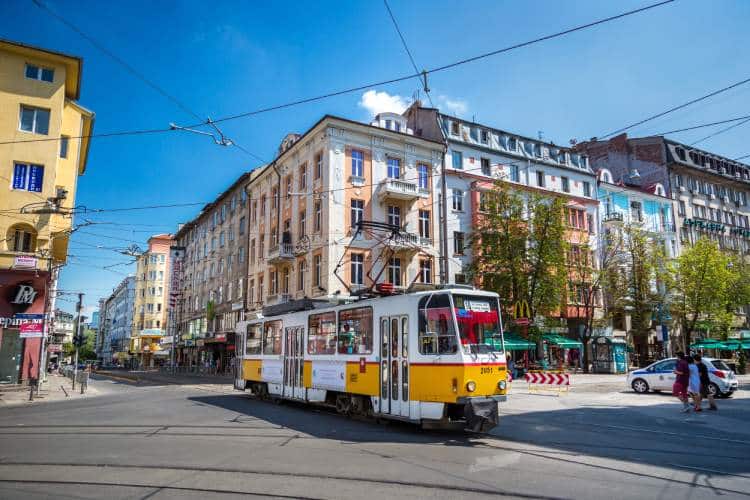
What Not to Miss in Bulgaria
Taste Rakia
This fruit brandy is widely available and crafted from various fruits such as peaches, apples, cherries, blackberries, and more, often infused with herbs, honey, or walnuts. Plum rakia, known as šljivovica, is the most popular and is sometimes consumed as a remedy for colds, sore throats, fevers, and other ailments.
Visit Rila Monastery
The Rila Monastery is arguably Bulgaria’s most renowned attraction. It holds the distinction of being a UNESCO World Heritage site due to its exquisite paintings and icons. Although it may appear rugged on the outside, its interior is reminiscent of a fairy tale. Visitors have the option to stay near Rila or even inside the monastery itself, in the humble quarters of a monk’s cell.
Devil’s Bridge
One of the country’s oldest and most beautiful bridges can be found in Ardino, a town in southern Bulgaria. Many locals avoid crossing the bridge at night due to a deep-seated fear of the shadow of the bridge builder’s wife, who passed away during its construction. Her shadow is believed to be encapsulated within the structure. Since 1984, the bridge has held the status of a cultural monument. This bridge also served as a filming location for “Time of Violence” (“Vreme Razdelno”), a Bulgarian film from 1988.

